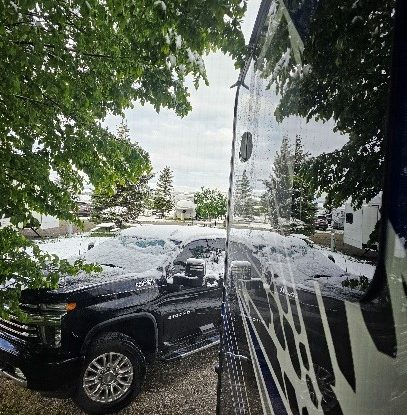
 Use common sense and err on the side of caution! We’ve all heard this phrase, but you can’t afford NOT to follow this advice when traveling in a 45-foot luxury motorhome. Recently, while in West Yellowstone at the end of June, we saw forecasts for snow, which meant possible frozen water lines. We couldn’t believe there would be snow so late in the season, but that night, we filled our freshwater tank, disconnected the water hose, and turned on the basement heat. We used our fireplace and Aqua-Hot heating system to stay toasty warm as we watched snow fall. Our basement never got colder than 55 degrees, and our water lines/tanks remained usable. It snowed off and on for three days, and we were grateful to have seen the forecast and taken preventative action. I’m sure others in the same park may not have been as lucky. Growing up as Scouts, we were taught to always be prepared, which is certainly at the top of the list, along with the “F” word – be FLEXIBLE! Being flexible and able to quickly make decisions and relocate will keep you and your family safe. Here are a few preparation tips to weather the storm when weather intensifies and the unexpected happens.
Use common sense and err on the side of caution! We’ve all heard this phrase, but you can’t afford NOT to follow this advice when traveling in a 45-foot luxury motorhome. Recently, while in West Yellowstone at the end of June, we saw forecasts for snow, which meant possible frozen water lines. We couldn’t believe there would be snow so late in the season, but that night, we filled our freshwater tank, disconnected the water hose, and turned on the basement heat. We used our fireplace and Aqua-Hot heating system to stay toasty warm as we watched snow fall. Our basement never got colder than 55 degrees, and our water lines/tanks remained usable. It snowed off and on for three days, and we were grateful to have seen the forecast and taken preventative action. I’m sure others in the same park may not have been as lucky. Growing up as Scouts, we were taught to always be prepared, which is certainly at the top of the list, along with the “F” word – be FLEXIBLE! Being flexible and able to quickly make decisions and relocate will keep you and your family safe. Here are a few preparation tips to weather the storm when weather intensifies and the unexpected happens.

- Stay Weather Aware. When we park, we tune our TV Dish to a local channel so we can monitor the weather daily. If you don’t use your TV, consider a weather radio or other technology. You can track weather using a smart phone, PC, or tablet, if you have electricity and service. Regardless of the technology, it’s important to track daily, so you are always prepared. During the recent snowstorm, our Starlink auto-heat feature kicked in and kept us connected the entire week.
- Go-Bag. Have a Go-Bag ready with vehicle keys, flashlight, prescription medicine, money, phones, chargers, laptops, bottled water, and a change of clothes. In the event you need to evacuate and leave your RV, having your bag ready means you can escape quickly, especially if the storm threatens your safety.
- Plan a departure route/strategy. While we were in the Florida panhandle, a hurricane was heading our way. We planned an escape route north to stay with friends in Alabama, the opposite direction of the storm’s path, and to continue to Texas if it turned. The storm took a shorter path southeast, so we didn’t end up going; however, we had a plan and knew how long it would take to get out of town and to a safer destination, both for us and our beautiful home on wheels. Another time, a tornado threatened us in Oklahoma. We found that a storm shelter was available across a field from the park, where there was a small medical facility. We had a plan and watched the weather on TV for hours until it was clear of our location.

- Charged up and full tanks. Before a storm, ensure you have full tanks of fuel in all vehicles. Having a full tank of fuel in the coach means we can run the generator as needed, which is an extra benefit. When hurricanes and tornados hit, fuel is often limited, so 150 gallons in the coach means you can get out of town to a safer location and run the generator! Along the same lines, ensure your batteries are fully charged, both chassis and house batteries.
- Secure everything outside. If it’s a lighter storm and you don’t need to evacuate, secure everything outside. We don’t leave much outside, but flying chairs or a BBQ grill can cause lots of damage when wind speeds rise. It’s also important to ensure all awnings are retracted and windows closed tightly. We also remove and pack our Magne Shades to avoid any chance of them detaching.
- Have plenty of water and nonperishable foods. Since we spend months at a time in our RV, we always have an extra case or two of water, along with nonperishable food. We fill gallon jugs with water to use with toilets and sinks and have a pantry full of staples we can prepare if we lose power or end up boondocking. We also carry firewood and a grill, so if we are without electricity for a period of time, we can cook food that might otherwise spoil. Don’t forget your favorite beverages, in case you attend a storm party.

- Have a plan for your pets. If you need to evacuate, pack food and supplies and put them into your vehicle along with your pets before packing other items. This ensures the pets are safe should you need to have the coach door open for an extended period as you pack other items.
- Empty your gray-water and black-water tanks a few hours prior to the inclement weather event. This ensures you have ample space to live a few days off the grid if you need to.
These are the things that are top of mind for us anytime we see inclement weather heading our way. Add to the list as you identify important items in your life. Stay safe and enjoy the adventure!
|
|


 In 2021, Jeri and Kenny Saulsbury sold their home in Texas, moved into their coach, and hit the road with their cat, Sophie, living the digital nomadic lifestyle. When not on the road, they call Panama City Beach, FL, home during the winter. Follow their adventures on Instagram @RVAdventureTime and Facebook #RVAdventureTime.
In 2021, Jeri and Kenny Saulsbury sold their home in Texas, moved into their coach, and hit the road with their cat, Sophie, living the digital nomadic lifestyle. When not on the road, they call Panama City Beach, FL, home during the winter. Follow their adventures on Instagram @RVAdventureTime and Facebook #RVAdventureTime.
Hey Jeri this is Cindy. Great article!